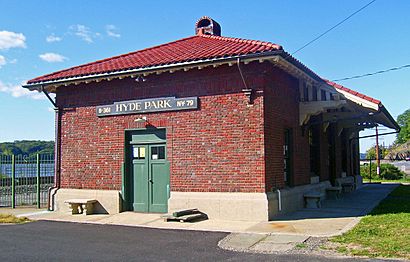Hyde Park station (New York Central Railroad) facts for kids
Quick facts for kids
Hyde Park
|
|||||||||||
|---|---|---|---|---|---|---|---|---|---|---|---|

Station building in 2007
|
|||||||||||
| Location | 34 River Road, Hyde Park, Dutchess County, New York 12538 | ||||||||||
| Platforms | 2 side | ||||||||||
| Tracks | 4 | ||||||||||
| History | |||||||||||
| Closed | 1958 | ||||||||||
| Former services | |||||||||||
|
|||||||||||
|
Hyde Park Railroad Station
|
|||||||||||
| Built | 1914 | ||||||||||
| Architect | Warren and Wetmore | ||||||||||
| Architectural style | Mission/Spanish Revival | ||||||||||
| NRHP reference No. | 81000403 | ||||||||||
| Added to NRHP | 1981 | ||||||||||
The Hyde Park train station was once a busy stop for trains in Hyde Park, New York. It sits right where Crum Elbow Creek meets the beautiful Hudson River. This historic building served the New York Central Railroad for many years.
The first wooden station was built here in 1851. It was part of the Hudson River Railroad, connecting New York City and Albany. Later, in 1914, a new and much grander building replaced it. This new station was designed in the beautiful Mission and Spanish Revival styles. The famous architects Warren and Wetmore designed it. They also designed Grand Central Terminal in New York City!
Contents
A Busy Hub for Travelers
The Hyde Park station was very popular for many years. It was close to large estates like the Vanderbilt Mansion. Later, it was also near the home of President Franklin D. Roosevelt.
President Roosevelt's Visits
President Roosevelt often traveled to his home in Hyde Park. He used this station during his time as president.
- In 1939, he met King George VI and Queen Elizabeth of the United Kingdom here. They were visiting the United States.
- In 1945, after his passing, President Roosevelt's body was brought to this station. From there, it was taken for burial.
Even with these important visitors, the station was mostly a local stop. Faster, named trains usually passed by without stopping.
The Station's Later Years
Over time, fewer people traveled by train. Cars and airplanes became more popular. Because of this, the Hyde Park station saw less and less use.
Closing Down
Regular train service stopped in 1953. For a few years, it might have been a "flag stop." This means a train would only stop if someone waved a flag to get on or off. The station officially closed in 1958. After that, two of the four train tracks were removed. The tunnel to the southbound platforms was also closed.
The New York Central Railroad eventually sold the station building. The Town of Hyde Park bought it. The railroad was selling many of its properties to try and stay in business.
Saving a Piece of History
After the station closed, it fell into disrepair. Young people tried to turn it into a teen center, but the project was not finished. By 1975, the building was abandoned and badly damaged by vandalism. It was almost torn down!
A New Purpose
Just in time, the Hudson Valley Railroad Society (HVRS) stepped in. They rented the station from the town for only one dollar a year. This agreement lasted for fifteen years. The HVRS worked hard to fix up the station. They repaired the roof and restored both the inside and outside. They turned the old station into a regional rail museum. To raise money, they held an annual model train show.
What's Happening Now
Today, the train tracks are still in use. CSX freight trains and Amtrak's Empire Service passenger trains use them. For safety, the tracks are fenced off from the old station.
There is a possibility that the Hyde Park station could become an active passenger station again. Some people hope to extend Metro-North's Hudson Line service. This commuter train line currently ends in Poughkeepsie. If it were extended northward, Hyde Park could once again welcome train passengers.
 | May Edward Chinn |
 | Rebecca Cole |
 | Alexa Canady |
 | Dorothy Lavinia Brown |

